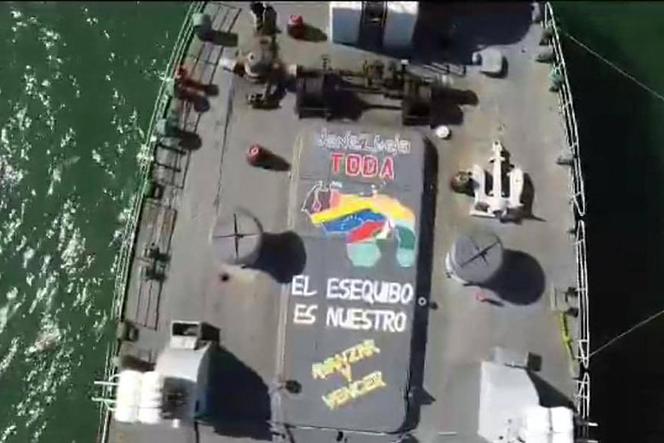


On one side, a British warship armed with 30-millimeter cannons; on the other, more than 5,000 Venezuelan soldiers, F-16 and Sukhoi fighter jets and amphibious vehicles. Is the December 14 peace declaration signed between Guyana and Venezuela concerning the territorial dispute between the two South American countries already obsolete?
Britain's dispatch of the HMS Trent, which arrived off the coast of Guyana on Friday, December 29, is seen by Nicolas Maduro as "an act of hostile provocation and a violation of the recent peace declaration." In response to this "unacceptable threat," on Thursday, the Venezuelan president launched military exercises calling for "the activation of a joint defensive action of the Bolivarian National Armed Forces" and the deployment of troops by air, land and sea near the border with Guyana.
"Venezuela cannot stand idly by in the face of this aggression," said the head of state on television, surrounded by high-ranking officers, after giving the green light to the operation: "Deploy yourselves, into battle!" Venezuelan TV channels then showed footage of fighter jets patrolling over warships, and soldiers equipped with missile launchers. These military exercises are "unjustified and should cease," said the United Kingdom the following day.
Guyana, for its part, does not consider the arrival of the British patrol boat to be a breach of the peace declaration. Georgetown has "no plans" to attack Venezuela. "President Maduro knows this and should not worry," said Vice President Bharrat Jagdeo on Thursday, adding that the ship's arrival was part of "routine exercises that have been planned for a long time."
The HMS Trent, usually based in the Mediterranean and sent to the Caribbean in early December to fight drug trafficking, is expected to take part in military exercises in Guyanese waters for "less than a week." As the port of Georgetown is not deep enough, the ship is not expected to dock there.
The tension, which had reached its height on Friday, had nevertheless subsided following the signing of the Argyle Declaration by Maduro and his Guyanese counterpart, Irfaan Ali, on December 14. Named after the Saint-Vincent-et-les-Grenadines airport where the meeting was held, the declaration commits Caracas and Georgetown not to resort to threats or use of force in the territorial dispute over Essequibo, which has been ongoing for more than 180 years. This 160,000-square-kilometer territory, rich in oil and natural resources, is administered by Guyana and claimed by Venezuela.
You have 55% of this article left to read. The rest is for subscribers only.
